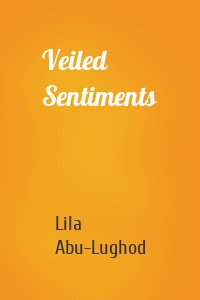Lila Abu-Lughod
2 кн.
Writing Women's Worlds
Lila Abu-Lughod draws on anthropological and feminist insights to construct a critical ethnography of a small Awlad 'Ali Bedouin community in Egypt. She explores how the telling of stories of everyday life challenges the power of anthropological theory to render adequately the lives of others and the way feminist theory appropriates Third World women.
| Автор | Lila Abu-Lughod |
Veiled Sentiments
First published in 1986, Lila Abu-Lughod’s <I>Veiled Sentiments</I> has become a classic ethnography in the field of anthropology. During the late 1970s and early 1980s, Abu-Lughod lived with a community of Bedouins in the Western Desert of Egypt for nearly two years, studying gender relations, morality, and the oral lyric poetry through which women and young men express personal feelings. The poems are haunting, the evocation of emotional life vivid. But...
| Автор | Lila Abu-Lughod |



